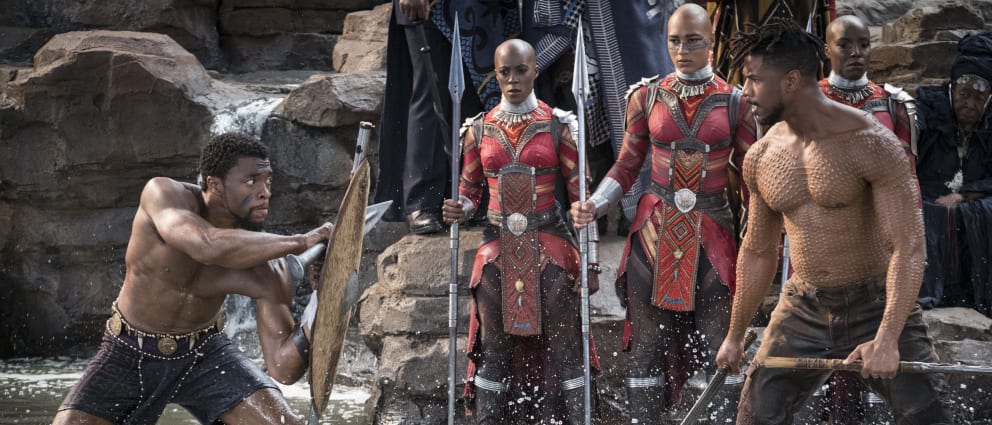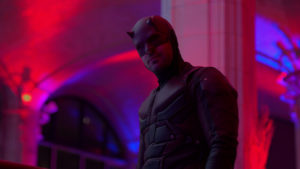This month is Power of Love month, but this week takes a slight detour because of the biggest movie of the year so far- a true cultural phenomenon. Black Panther features examples of both the light and dark side of Power of Conscience, and it tackles themes of what is right and who gets to decide that issue.
Black Panther
Black Panther tells the story of T’Challa (Chadwick Boseman), the recently coronated king of the fictional African nation of Wakanda. Built around the world’s rarest metal, Wakanda is the most technologically advanced nation on earth, and centuries ahead of everyone else in every respect. At its heart, it’s a story led by Power of Conscience character.
Power of Conscience Characters follow their own moral code and expect others to do the right thing. They operate on their own level of justice and think solely about what is right and what is wrong. Most importantly they are compelled to tackle in injustice and correct what they perceive as wrong-doing.
 T’Challa’s Moral Dilemma
T’Challa’s Moral Dilemma
T’Challa must compromise his moral code to become the leader that his country needs. He is challenged by a Power of Conscience antagonist that is the seeming opposite of everything he stands for. He learns to become the kind of leader who makes decisions that are for the greater good, despite opposition.
I will try to avoid spoilers for those of you who haven’t seen the movie- Go see it yourself!
Too Good To Be King
“You’re a good man, with a good heart — and it’s hard for a good man to be king.”
One of the central dilemmas that faces King T’Challa in Black Panther is whether he should cooperate with the rest of the world and share with them what Wakanda has to offer. Many in the nation he now leads believe that the world is not ready to interact with Wakanda.
Throughout the film, T’Challa does the right thing no matter the cost. Members of his family and his heads of security disapprove. When he learns of his father’s dark past, and his connection to film’s lead antagonist, Erik Kilmonger (Michael B. Jordan), he sympathizes with Erik and realizes he must lead Wakanda in a different direction to his ancestors.
T’Challa’s journey is going from being an uncertain man who does not feel ready to carry out what he knows the be right, to a King who has conviction in his actions.
Mirror Image
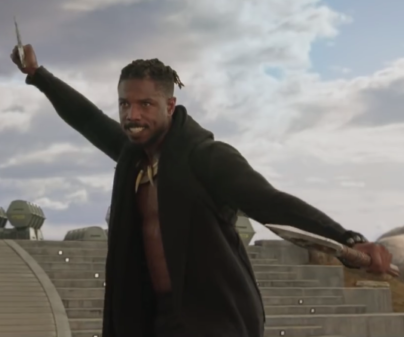 Erik Kilmonger (Michael B. Jordan) represents the dark side of Power of Conscience. Some people have already compared T’Challa and Kilmonger’s approaches to that of Martin Luther King and Malcolm X respectively. He is an outsider to Wakanda, determined to use Wakanda’s resources to benefit others. However, his vision is far more violent than T’Challa’s.
Erik Kilmonger (Michael B. Jordan) represents the dark side of Power of Conscience. Some people have already compared T’Challa and Kilmonger’s approaches to that of Martin Luther King and Malcolm X respectively. He is an outsider to Wakanda, determined to use Wakanda’s resources to benefit others. However, his vision is far more violent than T’Challa’s.
Erik takes it upon himself to take revenge for the injustices that the world has perpetrated on all his African forebearers. He believes that Wakanda has an obligation to help the oppressed outside of the nation. He is willing to shed blood to make sure that they rise up against inequality.
Erik shows how far Power of Conscience Characters will go to do what they believe is right. Although his intentions are noble, T’Challa knows that it will result in a scenario of endless bloodshed where no one truly wins. Erik is so blinded by his moral code that he becomes the kind of villain he wants to destroy.
Doing The Right Thing
Black Panther features both ends of the spectrum for Power of Conscience Characters. The film shows how far people are willing to go for the greater good, as they percieve it.
T’Challa becomes a better man when faced with constant challenges to his authority and beliefs. Erik is so blinded by rage and tragedy that he believes the ends justify the means. He goes too far in his attempt to conquer Wakanda and wage war on the world for past oppression.
Power of Conscience
Power of Conscience Characters provide plenty of opportunity for conflict in drama. They work well in serious or comedic stories. For more examples of Power of Conscience characters, check out my eBook about this Character Type at the ETB store.
]]>
by Guest Contributor Oscar Harding
Three of the highest-grossing films of all time are The Avengers and the two most recent installments of the Fast & Furious franchise. Besides a blockbuster budget and total abandonment of reality, they have something in common- they are ensemble pieces featuring much-loved characters interacting with each other.
Audiences have made it clear they want very different characters to come together for massive summer events. On the smaller screen, the latest attempt at capitalizing on this success has been Netflix’s The Defenders, bringing together the main characters from their 4 original series so far. The ratings aren’t believed to have been stellar, but critically it has received mixed reviews. It is an excellent opportunity to examine how different character types interact with each other when forced together by extraordinary circumstances.
Daredevil – Power of Love
Daredevil, the heroic alias for blind lawyer Matt Murdock (Charlie Cox) is all-too-human, his decisions- rather ironically- blinded by his love for his friends, his city, his religion and the troublesome Elektra (Elodie Yung). He can never truly be a perfect superhero, despite his incredible skills and decades of training, because he lets affection get in the way.
Daredevil has been compared to Batman, but whilst both are motivated by justice, Batman is not held back by love (he is a Power of Truth character) and trusts few people. Matt, however, regularly ignores his calling because he knows it will put people in harm’s way. The only reason he teams up with Jessica, Luke and Danny is an entire city of innocent people is at stake.
Power of Love characters can be undone by there constant need to be relied on, indulging in self-pity as they believe they go above and beyond for those they love and their devotion is not returned. The more attached Daredevil gets, the more he sabotages himself, and in The Defenders his love for the antagonist constantly hinders the team’s efforts to save New York City.
But it is this personality that means he is equally reliable and will always protect his fellow teammates. In the dire situation that The Defenders find themselves in, Daredevil’s Power of Love traits are their greatest strength as well as their greatest weakness.
Jessica Jones – Power of Reason
Private eye Jessica Jones (Krysten Ritter) is the polar opposite to Daredevil- the cynical alcoholic has little emotional attachment to anyone, driven only by the need to solve mysteries- it’s what she’s best at.
She is not obsessed with justice or love, and wants to defeat The Hand as soon as possible so she can be left alone. Everything but the mission at hand is a distraction.
Like all Power of Reason characters, be they detectives or not, Jessica sees the world as a series of puzzle to be solved, questions to be answers and codes to be cracked. The world has to adhere to set rules, and any deviation from that presents a problem. She also lacks the charm of other Private Eyes- Rick Deckard and Jake Gittes are Power of Truth characters who can use their charisma to achieve their objectives, but Jessica can’t rely on that.
Jessica, as reluctant as she is, is a vital part of The Defenders because … Luke is the emotional anchor, Daredevil is the defacto leader, and Iron Fist is the muscle, but Jessica is the one who drives the others to stay focused. Once she knows she has been proven right about this mystery that threatens New York, she is totally dedicated to the cause and never wavers. This cobbled-together team is an uneasy alliance, and when Jessica knows they are vital to restoring order, she is ruthless in making them stick to their objective.
Luke Cage – Power of Conscience
Bulletproof hero Luke Cage (Mike Colter) was once described by a nemesis as “Harlem’s Captain America”, and it’s an apt description. Like Captain America, Luke is a Power of Conscience character.
These characters believe they have to look out for others. They have a profound sense of right and wrong. Luke is no exception- He fights for what he believes to be moral and right. He will sacrifice everything to be Harlem’s hero, looking out for the residents of the borough because he thinks no one else will.
He encounters the rest of The Defenders whilst on a mission to deliver justice for a resident of Harlem who has been ruined by the secret organization, The Hand. The others cross paths whilst undertaking a quest or to solve a mystery- only Luke is acting out of the interest of someone else. This action speaks volumes about his character.
As part of an ensemble, he is the real anchor of the group. Jessica is reluctant to be part of the team every step of the way, Daredevil is blinded by his love for the enemy. Danny is unfocused in terms of who he is, and his mission. Luke has to remind them why they are fighting, who they are fighting for, and what is at stake. Like Jessica, he is reluctant to be part of The Defenders but understands it is necessary for them to stand to together. He is their moral compass and their steadying influence is essential with a group of such wildcards.
Iron Fist – Power of Ambition
Danny Rand (Finn Jones) refers to himself by the mouthful of a title “The Immortal Iron Fist, Protector of K’un-L’un and sworn enemy of The Hand”. It’s pretty obvious that he puts up a front to impress others.
He thinks that focusing on the mission will make him impervious to criticism, and will gain him the respect of others. Power of Ambition characters like Danny seek approval and often put on a facade to make themselves seem worthy of that approval. Whether they be ninjas with a magic hand or more pedestrian characters like Michael Scott or David Brent.
Danny has a reason for this behavior that does evoke empathy- the only survivor when his family’s plane crashed in the Far East, the young Danny was taken in by an ancient order of Monks and trained to be a weapon. He effectively has been brainwashed rather than having developed true conviction. Such a tragic childhood means he is searching for people that will accept him and give him the love he hasn’t received since his parents’ death.
Danny is the one that brings together The Defenders- since he has the most knowledge of the enemy and their evil plan. He becomes the key to The Hand’s scheme which has been centuries in the making. Danny finally becomes the center of attention for good and bad reasons. He gets what he wants but has to learn humility and realize he has found, in The Defenders, the honest acceptance he has craved since he was an orphaned child.
For more examples of all the character types, you can purchase my in-depth e-books at the ETB shop, or you can read more articles on all the “Power Of…” types including James Bond, Doctor Who, Batman and Sherlock Holmes, every Tuesday.
There are also 9 pinterest boards full of character examples online. Check them out and let us know at [email protected] if you have any other suggestions.
]]>
by Guest Contributor Oscar Harding
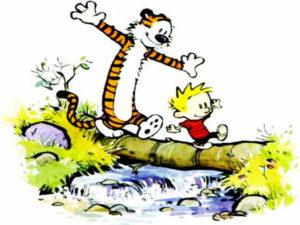
Bill Watterson’s comic strip Calvin and Hobbes, which ran from 1985 to 1995, is to my mind the greatest comic strip of all time, surpassing even Charles Schultz’s Peanuts. Besides Watterson’s stunning art, profound philosophy and brilliant wit, it is the core friendship that has ensured that the strip has been remembered for many years since it finished. Named after Philosophers with rather dour opinions of humanity, Calvin is a 6-year-old boy and Hobbes is his stuffed tiger, real only to him. What is surprising about these closest of friends is just how different their character types are. But it goes to show that opposites attract, and these two bring out the best and worst in each other because of their character types.
Named after Philosophers with rather dour opinions of humanity, Calvin is a 6-year-old boy and Hobbes is his stuffed tiger, real only to him. What is surprising about these closest of friends is just how different their Character Types are. But it goes to show that opposites attract, and these two bring out the best and worst in each other.
Calvin
Calvin could be argued to be the ultimate Power of Excitement character. Indulging in fantasies as superhero Stupendous Man, intergalactic warrior Spaceman Spiff and hardboiled detective Tracer Bullet, when he’s not making the lives of his parents and teachers an absolute nightmare, he’s wreaking havoc as an inventor of disastrous machines out of cardboard boxes. Calvin ticks every box for a Power of Excitement character- he is an explorer, believing life should always be one big playground where he gets his way. He very rarely veers from his pursuit of fun. He is certainly the life of the party, and there is never a dull moment with Calvin. He represents both the light and dark side to the character type- his escapades are fun to read, but you can only imagine the destruction his ‘junkie mentality’ is causing others around him, as he can never get enough of what he believes to be fun.
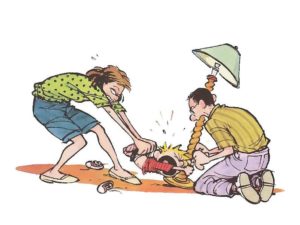 Calvin ticks every box for a Power of Excitement character- he is an explorer, believing life should always be one big playground where he gets his way. He very rarely veers from his pursuit of fun. He is certainly the life of the party, and there is never a dull moment with Calvin. He represents both the light and dark side of the Character Type- his escapades are fun to read, but you can only imagine the destruction his ‘thrill junkie mentality’ is causing others around him.
Calvin ticks every box for a Power of Excitement character- he is an explorer, believing life should always be one big playground where he gets his way. He very rarely veers from his pursuit of fun. He is certainly the life of the party, and there is never a dull moment with Calvin. He represents both the light and dark side of the Character Type- his escapades are fun to read, but you can only imagine the destruction his ‘thrill junkie mentality’ is causing others around him.
Hobbes
Hobbes is part philosopher and all Tiger. No matter how insightful he can be about life in general, he has all the instincts of a “Homicidal Psycho Jungle Cat”. Power of Conscience characters believe they are their brother’s keeper. Hobbes is forever the reluctant participant or sits out Calvin’s most outrageous schemes. Many strips often end with Hobbes trying to persuade Calvin not to do the wrong thing, or showing his viewpoint to be wrong. These characters also adhere to what they believe to be indisputably right- in this case, the laws of nature. Hobbes always stands up for the natural world and his fellow animals
These two work so well together because they balance each other out. Hobbes usually has incredible fun when he’s with Calvin, but at the same time, he is the equivalent of an angel on Calvin’s shoulder- although it often falls on deaf ears. One could technically be considered “good” (Hobbes) and the other “bad” (Calvin). The boy has growing up to do, and the Tiger could lighten up.
For more examples of all the character types, you can purchase my in-depth e-books at the ETB shop, or you can read more articles on all the “Power Of…” types including James Bond, Doctor Who, Batman and Sherlock Holmes, every Tuesday.
There are also 9 Pinterest boards full of character examples online. Check them out and let us know at [email protected] if you have any other suggestions or questions.
]]>
 I had an interesting email exchange with a reader and wanted to post my reply. He took issue with the muddy plot in The Dark Knight.
I had an interesting email exchange with a reader and wanted to post my reply. He took issue with the muddy plot in The Dark Knight.
Several critics agree and one reviewer blasts the movie on that score saying: “Nolan’s latest exploration of the Batman mythology steeps its muddled plot in so much murk that the Joker’s maniacal nihilism comes to seem like a recurrent grace note.” The review goes on to decry the “airless complexity” of the story.
The Dark Knight is a classic example of the Emotional Toolbox premise that– “In the battle between reason (plot) and emotion (connection), emotion ALWAYS wins.”
Audiences will forgive almost anything if the emotional connection in a film is strong enough. If the emotional bond isn’t strong enough then very little else will salvage a movie.
The country seems to be in a very pessimistic mood these days. Polls are showing more people losing confidence in the economy and feeling like the country is headed in the wrong direction than any time since the Great Depression. The Dark Knight reflects the general sense of being trapped in choices, all of which are bad.
We also haven’t fully mourned our fallen in Iraq either. We never see their coffins coming home. We never see any of the funeral ceremonies. We keep putting on foot in front of the other despite the enormous personal and emotional cost. I think that is what Batman is forced to do. He even continues the fight under false assumptions– Alfred burned the note Rachel sent him.
If you’ve just come to my blog– there is a short essay about The Joker in an earlier post. His role is so pivotal in all of this. What we fear most is chaos. That’s what people sense right now– being on the edge of chaos.
The Dark Knight is hooking into emotional themes beyond the movie’s plot points. The question for any writer, not just those who write about Super Heroes, is– How does your script connect with the deeper emotions of your audience?
Mark Gill gave a powerful keynote before the NALIP Conference
He says in part:
Quality of emotional content is what matters, period. In a world with too many choices, companies are finally realizing they can’t risk the marketing money on most movies.
In the end, all of this (effort in movie-making) has to add up, seamlessly if possible, to something that moves us– to the quality of the emotional content. It doesn’t matter if we’re talking about thrills, laughs, tears, or an adrenaline rush. What matters is that we are engaged and, ideally, emotionally transformed and satisfied.
In a world increasingly dominated by numbers– financial, technological and most importantly the finite number of hours in a day, our very human desire for contact, meaning and emotional transformation isn’t going away. It’s growing. Those who remember that will survive and most probably win.
That is the premise on which I founded The Emotional Toolbox and creating that emotional authenticity and connection is at the core of The Nine Character Types eBooks.
]]> I am still looking out over the hills and trees of the rolling area surrounding the Mississippi River, thinking about the latest Batman movie. The Dark Knight is a powerful and classic Power of Truth film.
I am still looking out over the hills and trees of the rolling area surrounding the Mississippi River, thinking about the latest Batman movie. The Dark Knight is a powerful and classic Power of Truth film.
In a Power of Truth film things are never what they seem. None of the major characters in The Dark Knight are what they seem at first glance. The tangled undergrowth of human duplicity catches and pulls at every character in the film.
In the beginning of the film, Batman tries to find out the truth about one thing: a spectacular bank robbery. Over the course of the film, he finds out the truth about a larger thing: what happens to human nature under the extreme duress of chaos. In the end, he finds out the truth about himself: he is both stronger and weaker than he imagined.
In the movie, criminal acts are just the surface. This surface, upon closer inspection, is tangled up with its own deeper undergrowth of human darkness. Once the surface of the crime is cracked, chasms open that no one could have imagined.
Batman is continually looking for answers that elude him. He is caught in the eternal Power of Truth paradox: Seeking certainty in an uncertain world only brings more uncertainty. Who is he? Does Gotham need him? Will he break his “one rule” to save the woman he loves? How “bad” is he willing to be to do “good”? How easy would it be for him to permanently cross over into the Dark Side?
Christian Bale, the actor who plays Batman says: “Now you have not just a young man in pain attempting to find some kind of an answer, you have somebody who actually has power, who is burdened by that power, and is having to recognize the difference between attaining that power and holding on to it.” What is the real truth about Batman?
Not only is Bruce Wayne not what he seems. Batman is not what he seems. At the end of the film, he takes on the burden of Two Face’s crimes to give Gotham a “hero,” turning himself into someone he’s not in the eyes of the public. Batman tries to “save” Gotham from the truth.
Lt. James Gordon speaks of Batman’s new role saying: “Because he’s the hero Gotham deserves, but not the one it needs right now… and so we’ll hunt him, because he can take it. Because he’s not a hero. He’s a silent guardian, a watchful protector… a dark knight.”
Batman says: “Sometimes, truth isn’t good enough, sometimes people deserve more. Sometimes people deserve to have their faith rewarded.” Alfred, by destroying Rachel’s final farewell letter echoes Batman sentiments and saves Batman, himself, from the awful truth that Batman had lost Rachel long before she died.
Everyone in the film is bound up in the tangled undergrowth of human duplicity.
There’s more about Power of Truth characters and stories in my forthcoming eBooks on The Nine Character Types.
]]> Today I’m sitting on a screened porch in Wisconsin, on vacation, and taking a closer look at another Character Type in The Dark Knight. Alfred, Bruce Wayne’s long-time friend, confident and butler, is a classic Power of Love character.
Today I’m sitting on a screened porch in Wisconsin, on vacation, and taking a closer look at another Character Type in The Dark Knight. Alfred, Bruce Wayne’s long-time friend, confident and butler, is a classic Power of Love character.
A character driven by the Power of Love is often someone who tirelessly pushes another forward in a story. Although typically developed as a female character, a Power of Love character can also be a compelling male ensemble player (or even lead). These characters— often soft-spoken, gentle and compliant on the outside— are made of strong, even steely, stuff on the inside. They believe the best place to be is the “power behind the throne.”
All these qualities are very evident with Alfred. His courtesy and refined manners mask a steely determination and protectiveness on Bruce Wayne/Batman’s behalf. Alfred stands just behind Batman’s power and is a subtle but strong presence in the story.
Alfred: I suppose they’ll lock me up as well. As your accomplice…
Bruce/Batman: Accomplice? I’m going to tell them the whole thing was your idea.
In a large part the whole concept of Batman is Alfred’s idea. Bruce/Batman’s continuing story hinges on a key action Alfred takes.
Power of Love characters are defined by their determination. They will not give up on whatever goal, scheme or objective they have in mind for the object of their attention. These characters sincerely do believe they know what is best for others. They can be very cunning in controlling and manipulating others (always for the other person’s own welfare).
Alfred advises, consoles and prods Bruce/Batman through-out the film. Rachel entrusts Alfred with the note that, ironically, are her last words. Alfred first delivers Rachel’s farewell note and then surreptitiously takes it and burns it. He does so out of love for Bruce/Batman, and he sincerely believes he (Alfred) knows what is best. Maybe so, but Alfred also deprives Bruce/Batman of the truth and the last words of the woman he loves.
]]>